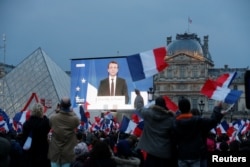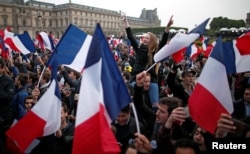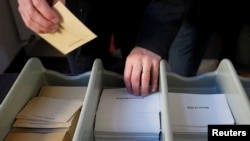Voters in France have elected centrist Emmanuel Macron president, rejecting the anti-EU, anti-immigrant policies of rival Marine Le Pen.
With nearly all votes counted, France's Interior Ministry put Macron's lead at 66.06 percent, with Le Pen coming in at 33.94 percent.
“A new page of our long history is turning tonight,” Macron told supporters Sunday following a bruising campaign in an election driven by anti-establishment sentiments – the first in modern history in which mainstream parties were shut out of a French presidential race.
“I want it to be a page of hope and renewed trust. The renewal of our political life will begin as early as tomorrow. The moralization of our political life, acknowledging its plurality and our democratic vitality will be at the heart of my action from day one,” Macron said.
Contentious campaign
Sunday culminated a presidential election campaign that many French considered the country's most acrimonious and contentious in recent memory.
Concession by Marine Le Pen came quickly on Sunday, but she vowed to fight on with efforts to mobilize voters in her crusade against globalism and a liberal immigration policy that has allowed for France’s Muslim minority to grow.
“I have called Macron because I have the best interests of France in mind and I wanted to wish him the very best,” she told supporters on Sunday. “I call on all patriots to join us to take part in the decisive political fight that is starting tonight. More than ever in the forthcoming months, France will need you.”
U.S. President Donald Trump reacted on Twitter to the results of the French presidential election, congratulating Macron on a "big win" and saying he very much looks forward to working with him.
Surveys heading into Sunday predicted that Macron would win the election with a solid lead over Le Pen.
There was little surprise, but much relief among his supporters, who filled the main courtyard of the Louvre Museum for a celebration.
“I feared Marine Le Pen because she sowed division in this country,” said Frank Kamandoko, a reveler waving a large French flag at the Louvre Sunday night. “That is why I had no choice but to support Emmanuel Macron,” said Kamandoko, a French citizen originally from the Central African Republic.
At 39, Macron a former banker and economy minister, becomes France’s youngest president. He is pro-EU but wants reforms to make the grouping more democratic, and has warned that continuing business as usual with the European Union will trigger a Frexit, or a French exit similar to Britain’s.
France’s deep divisions were clear in a final, vicious debate in which the anger, bitterness and personal dislike between the two candidates were on display when the two traded insults last week, something observers say hurt Le Pen’s numbers.
‘What is his plan?’
“I am sick of this campaign,” said voter Jasmine Youssi after being among the first to cast ballots at a polling station in the 12th district of Paris. “It is the first time there has been such an aggressive campaign. It was repetitive. I stopped watching TV because it would make me sick. I am so glad it is over,” she told VOA.
Turnout was less than expected, with voter disgust and anger causing many to abstain or submit blank ballots. French officials say 4 million abstained.
Still, many braved the rain in Paris and turned out steadily throughout the day.
On Paris streets, posters of Macron and Le Pen were pasted side by side, both often defaced with Macron’s nose cut out and Le Pen’s eyes scribbled over.
“It says that the people are for neither one nor the other. The French are in distress,” said voter Brigitte Levoir as she glanced at posters outside a polling station in the Paris suburb of Drancy. “We could perhaps be afraid of Le Pen, but we should be afraid of Macron as well. What is his plan? He has none. We should be afraid of them both. I want De Gaulle to come back to the world and establish some order,” she told VOA.
In the end, it was fear of Le Pen that apparently weighed more on voters than anything else in a society that is proud of its long tradition of openness.
“The majority of French people are afraid of Marine Le Pen, are afraid of the far right,” said Eric Dupin, a political analyst in Paris. “If they get to power, they will grow divisions in French society in a very dangerous way with the risk of violence. So, in a reasonable way, the French voted Macron against Marine Le Pen,” he told VOA.
The vote was historic, and seen by many as a turning point in French politics.
France voted for change, but not revolution.










